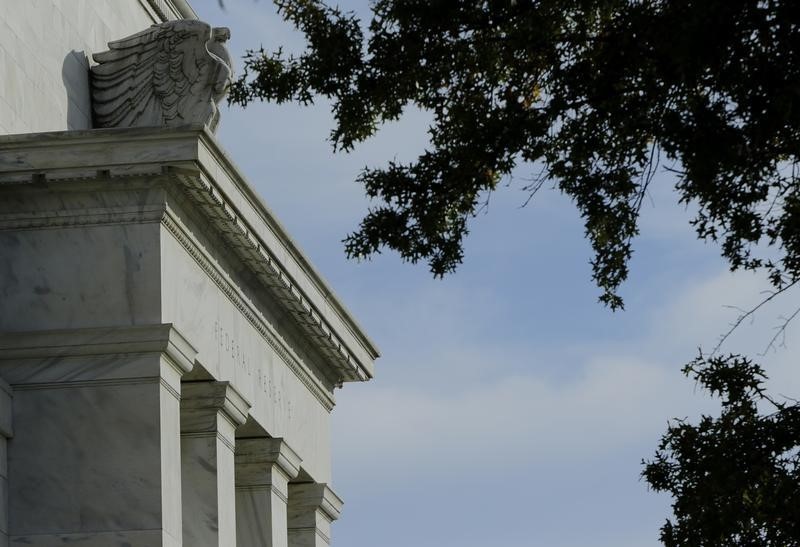By Michael Flaherty and Jonathan Spicer
WASHINGTON/NEW YORK (Reuters) - Sections of the U.S. financial system that may be vulnerable to investor panic are raising concerns inside the Federal Reserve, as policymakers preparing for the first interest-rate hike in nearly a decade seek to ensure the market is ready and able to handle it whenever it happens.
Years of Fed bond-buying and new bank rules are seen to have left the ultra-liquid U.S. Treasuries market more vulnerable to an abrupt selloff. But in particular, the Fed is worried whether the booming asset management industry can withstand a run of redemptions in a financial crisis.
Chief among the Fed's concerns, increasingly voiced in public remarks, is that certain funds held by individuals and institutions will not have the underlying assets sufficient to back investors cashing out in a panic. This lack of liquidity would expose investors and the economy to sharp price swings.
Meanwhile, bond inventories at primary dealers have plunged alongside a drop in overall Treasury securities in circulation. The fall in liquidity across portions of the bond market comes amid a jump in volatility, making it vital that Fed officials telegraph their tightening plans well ahead of time.
The central bank's nightmare scenario is in surprising markets, exposing investors to the liquidity risks it fears, and causing a spike in borrowing costs that hurts economic growth.
"Some open-ended mutual funds offer daily withdrawal privileges but invest in assets that take longer to sell and settle," Fed Vice Chair Stanley Fischer said in a speech last month. Fed Governor Daniel Tarullo and Atlanta Fed President Dennis Lockhart have offered similar warnings about liquidity in the last few months.
Asset managers have said they are systemically safe. But Fed officials have noted a surge in asset management inflows and concentration. One example is fixed income exchange-traded-fund assets, which reached $246 billion in 2013 from their inception in 2002, according to Greenwich Associates.
New York Fed President William Dudley has warned that investors are less inclined to hold liquid assets as memories of the 2007-2009 financial crisis fade.
The Fed could slow or delay rate hikes "if financial conditions were to tighten a lot," Dudley said this week. Still, the Fed will be as clear as possible. "I'll be very surprised if, whenever normalization occurs, it will be a big surprise to anyone - if we're doing our job properly," he added.
TANTRUM WORRIES
The Fed has kept interest rates near zero since late 2008 and has embarked on three rounds of large scale bond purchases to stimulate economic recovery.
While the Fed could hike rates as early as June, the economy's weak winter performance has pushed expectations of a hike more toward September. Futures traders are betting on a move as late as December.
That disconnect sets up a potential collision if the central bank hikes faster than expected, a collision that could send ripples across the asset management industry.
"Part of what's going on is (investors are) not being convinced that we're going to raise interest rates," Loretta Mester, president of the Cleveland Fed, told economists last week.
Bond markets could still be susceptible to another "taper tantrum" such as the one that happened in 2013 when then-Fed Chairman Ben Bernanke caught investors off guard by suggesting the central bank could trim bond purchases in coming months.
Deutsche Bank economists pointed out that the share of Treasuries now held by primary dealers is less than a third of what it was before the crisis, though they also said there is not yet "broad market impairment."
Stricter capital rules for banks have been cited for sapping liquidity from derivatives markets. Some 36 percent of 376 market participants polled by the International Swaps and Derivatives Association said markets were less liquid over the last year, while 6 percent saw more liquidity.

"Liquid markets could quickly turn illiquid in response to a shift in Fed policy or some other shock, which could amplify any adverse market response, as occurred during the taper tantrum," the Deutsche Bank (XETRA:DBKGn) economists wrote in a client note.